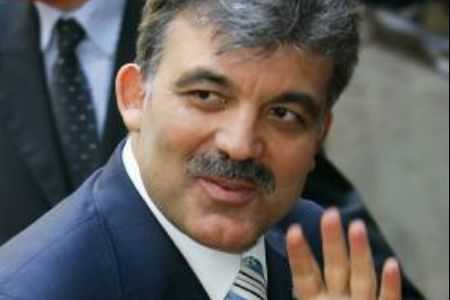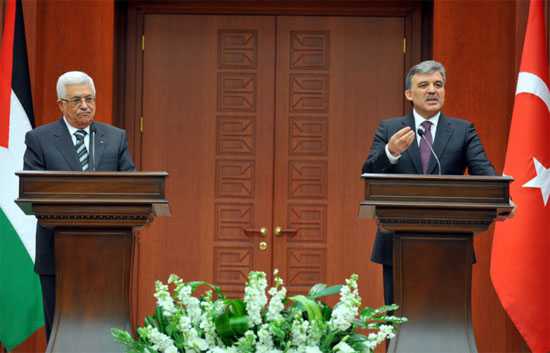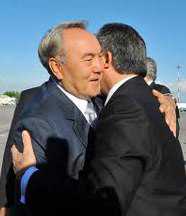Turkey is transforming. Ankara is developing economic and diplomatic relations with its neighbours, prompting many in the global community to talk of “axis shift”. Turkish President Abdullah Gül has given a candid interview to euronews mapping out where his country might be heading next.
 Euronews: Turkey is developing and extending its relations in the region and this has led a flurry of debate in the West. Where is the country heading? Is Turkey turning away from the West? Is it shifting on its axis?
Euronews: Turkey is developing and extending its relations in the region and this has led a flurry of debate in the West. Where is the country heading? Is Turkey turning away from the West? Is it shifting on its axis?
Gül: There has been a lot of talk about this recently and I am following it all closely. My view is, as I’ve always said, that much of it is wrong. Some of these comments have been made intentionally and others out of ignorance. Turkey’s aim is very clear. We working towards the most advanced democratic and economic standards we can, and to improve standards. We have had to change the Constitution but we have also benefited from geopolitical opportunities; we have historical advantages as well. We are looking at a multi-directional policy.
Euronews: You said some comments were made intentionally. What do you mean by that?
Gül: Before, Turkey’s foreign policy was on the wrong foot. Imagine a country that always has problems with its neighbors. Its trade and economic relations with them are barely operational. This should not be the case. Turkey was like a dead-end street; now it is more of a crossroads. Look at the level of trade between France and Germany, Canada and the US, or any other countries who share a border. They are all doing well but Turkey’s trade with its neighbors was very poor. We were on the wrong axis. Turkey is settling on the right axis now.
Euronews: During the most recent NATO summit, thanks to your insistence, no specific country was mentioned as a target for the new missile shield system. But French President Nicolas Sarkozy said, “call a spade a spade,” clearly referring to Iran. What do you think about that?
Gül: Firstly, looking beyond the actual statement, our decision was made on moral grounds. NATO, as you know, is a defence network. It is not an assault organization and does not target any specific country. This anti-missile system is aimed against any country that has or could develop missile capability. There may be many in the future and so they would also have to be included under the system’s range. That is why our decision was morally driven. A general threat assessment was made. Otherwise, it would be wrong to single out countries one by one. Imagine if the threat originated in another member state?
Euronews: What then do you think about the idea of including countries that are not NATO members, Israel in particular, under this umbrella?
Gül: That is out of the question. It can never happen because this only concerns NATO members. Israel is not a NATO member. It does not even cooperate with NATO. This would be impossible. Lets be clear; I am saying that Israel cannot use NATO facilities.
Euronews: After the Gaza flotilla incident, could Turkey still be described as a friend and an ally of Israel in the Middle East?
Gül: Frankly, many things changed irrevocably after the flotilla incident. The Israeli army attacked a flotilla carrying humanitarian aid while it was in international waters in the middle of the Mediterranean Sea, and unfortunately several people were killed. It is not possible for us to forget this.
Euronews: Is Israel’s friendship with Turkey over?
Gül: Absolutely. Israel has lost the friendship of Turkey and of Turkish citizens.
Euronews: Mr. President, there seems to have been some differences between Turkey and the West over Iran’s nuclear policy. The emphasis in the West is on concern about capability, while Turkey insists on the value of diplomacy. Is there a fundamental difference in the concept of security between the West and Turkey?
Gül: No. Of course Turkey is likely to be very cautious regarding any issue concerning a neighbour. This is no joke. If there is no diplomacy, the alternative is war. Look what happened in Iraq. Diplomacy failed and that led to war. Who paid the price of that war? The people of Iraq and the country’s neighbours, of course.
Euronews: Let’s talk about the EU. More than half of the negotiation chapters are stymied and support for EU membership in Turkey has plunged from 70 percent to around 30 percent. At this point, do you think EU membership for Turkey is still a realistic aim?
Gül: For us, joining the European Union is a matter of national concern. We are very committed to it. It goes beyond political parties. It is of strategic importance to us.
Moreover, the negotiations started in 2005. Most of the leaders that signed that agreement are still in office, and almost all of them are still alive (!). So they can be held to their promise.
Euronews: If Turkey ends up not joining the EU, is there a Plan B or an alternative project?
Gül: Turkey does not have a plan B. But even we reach the end of our harmonisation process and the Commission says ‘Turkey is ready for membership’, the process will not be over. Some EU members will hold referendums. We don’t know how this will turn out and we also have no idea what the Turkish people will think. Maybe they will act like the Norwegians. But what is we must not do is drag our feet over the negotiations. This would be shortsighted and, there are some who don’t have this kind of strategic vision. They focus more on day-to-day, trivial problems.
Euronews: Turkey has taken important steps towards democratization in recent years, like the recent referendum on the constitution. However, the picture is totally different when it comes to press freedom, which is considered as a fundamental component of a democracy. The situation here is not good. Isn’t this a bit of a discrepancy?
Gül: Of course the freedom of the press is one of the main pillars of a democracy. It makes a country more transparent and acts as a monitor on the government. In that respect, it is a priority for us, and many improvements have been made. Too many journalists have found themselves in court over what they do. This worries me. I have commissioned a government study and, as I understand it, a change in the law is on the cards.
Copyright © 2010 euronews
Interview : http://www.euronews.net/2010/12/03/israel-s-friendship-with-turkey-is-over-gul/






